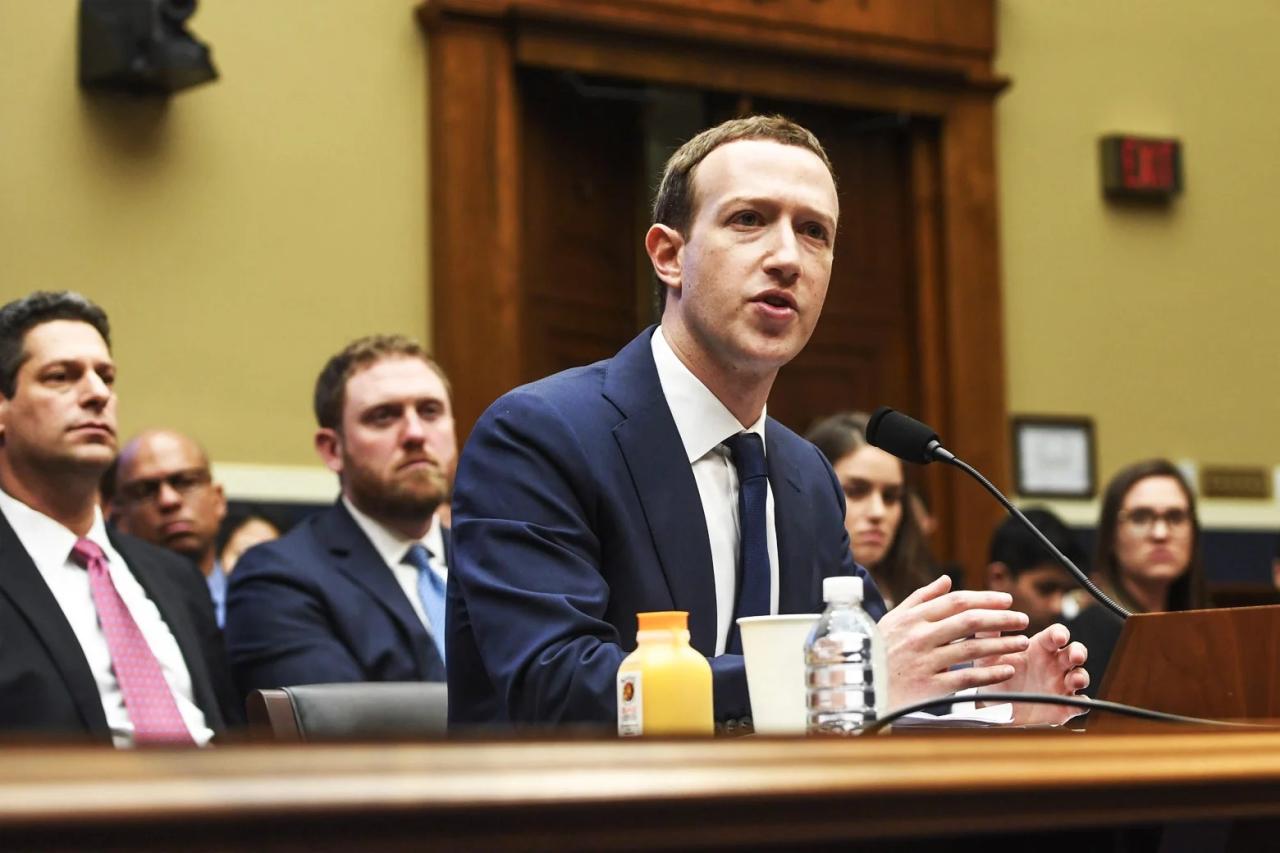The Meeting’s Context
The meeting between Mark Zuckerberg and conservative leaders is a significant event in the ongoing saga of tech giants navigating the complexities of political discourse in the United States. This meeting comes amidst a deeply polarized political climate, where the divide between conservative and liberal ideologies has intensified, particularly on social media platforms.
The current political landscape is characterized by an increasingly fragmented media environment, where individuals often consume news and information that aligns with their existing beliefs, reinforcing existing biases and hindering meaningful dialogue. This phenomenon, often referred to as an “echo chamber,” contributes to the polarization of political views, as individuals are less exposed to opposing perspectives.
Meta’s Controversies
Meta, the parent company of Facebook, has been at the center of numerous controversies related to content moderation and alleged bias in its algorithms. Critics argue that Meta’s platforms have been used to spread misinformation and amplify extremist voices, leading to concerns about the potential for social unrest and political manipulation.
- One of the most prominent accusations against Meta is that its algorithms suppress conservative content, leading to claims of censorship and a “liberal bias.” These claims are based on anecdotal evidence and studies that have been disputed by Meta, which maintains that its algorithms are designed to promote content that is relevant and engaging to users, regardless of political affiliation.
- Additionally, Meta has faced criticism for its handling of content related to the 2020 US presidential election, with allegations that the platform failed to adequately address misinformation and election interference attempts. This has led to calls for increased regulation of social media platforms and greater transparency in their content moderation practices.
Zuckerberg’s Motivations
Zuckerberg’s decision to meet with conservative leaders is likely driven by a combination of factors, including his personal views and Meta’s business interests.
- While Zuckerberg has publicly stated that he believes in the importance of free speech and open dialogue, he has also acknowledged the challenges of balancing these principles with the need to protect users from harmful content. The meeting with conservative leaders could be seen as an attempt to address concerns about Meta’s content moderation practices and demonstrate a commitment to fairness and neutrality.
- From a business perspective, Meta has a strong incentive to maintain a healthy and engaged user base across the political spectrum. Engaging with conservative leaders could be seen as a strategy to build trust and goodwill among this demographic, potentially mitigating concerns about bias and censorship, and ultimately enhancing Meta’s user engagement and advertising revenue.
Key Topics of Discussion
This meeting between Mark Zuckerberg and conservative leaders is likely to be a tense affair, with both sides holding strong views on the role of social media in society. The key topics of discussion are likely to center around content moderation, free speech, and the influence of social media on public discourse.
Content Moderation
Conservatives have been vocal critics of Meta’s content moderation policies, arguing that they unfairly target conservative voices and suppress their viewpoints. They believe that these policies stifle free speech and create a hostile environment for conservative users on Meta platforms.
Conservatives argue that Meta’s content moderation policies are often based on subjective criteria and lack transparency. They cite instances where posts expressing conservative viewpoints have been removed or flagged for violations, while similar content from liberal users remains untouched. They demand greater transparency and accountability in Meta’s content moderation process, as well as a more balanced approach that respects the diverse viewpoints of all users.
Meta, on the other hand, maintains that its content moderation policies are designed to protect users from harmful content, such as hate speech, harassment, and misinformation. They argue that their policies are applied consistently across the board and that they are constantly working to improve their systems.
Free Speech
Conservatives view free speech as a fundamental right that is essential for a healthy democracy. They believe that social media platforms should provide a neutral space for the free exchange of ideas, even those that are controversial or unpopular. They argue that Meta’s content moderation policies have created a chilling effect on free speech, discouraging users from expressing their views for fear of censorship.
Conservatives believe that Meta’s content moderation policies are often used to silence dissenting voices and promote a particular political agenda. They argue that these policies are a form of censorship that undermines the principles of free speech and democratic discourse.
Meta, however, argues that free speech is not absolute and that it has a responsibility to protect its users from harmful content. They believe that their content moderation policies are necessary to create a safe and inclusive environment for all users.
Role of Social Media in Shaping Public Discourse
Conservatives are concerned about the influence of social media platforms like Facebook and Instagram on public discourse. They believe that these platforms have become increasingly politicized and that they are being used to spread misinformation and propaganda. They argue that social media platforms are amplifying voices that are harmful to society and contributing to the polarization of the political landscape.
Conservatives believe that social media platforms have a responsibility to promote a more balanced and informed public discourse. They demand that Meta take steps to combat the spread of misinformation, promote fact-checking, and reduce the influence of extremist and divisive voices.
Meta acknowledges the influence of social media on public discourse and recognizes the importance of addressing concerns about misinformation and polarization. They are investing in initiatives to combat misinformation, promote fact-checking, and create a more inclusive and balanced platform.
Potential Outcomes
The meeting between Mark Zuckerberg and conservative leaders could have a range of outcomes, from a productive dialogue to a stalemate or even further escalation of tensions. The meeting’s impact will depend on the willingness of both sides to listen, understand, and compromise.
Impact on Meta’s Relationship with Conservative Users and Influencers
The outcome of the meeting could significantly impact Meta’s relationship with conservative users and influencers. If the meeting leads to a productive dialogue and a sense of understanding, it could help to bridge the gap between Meta and conservative communities. This could lead to increased trust and engagement from conservative users, potentially resulting in a more diverse and inclusive platform. However, if the meeting fails to address key concerns or results in further mistrust, it could exacerbate existing tensions and lead to a decline in conservative engagement on Meta’s platforms.
A successful meeting could lead to a more diverse and inclusive Meta, while a failed meeting could exacerbate existing tensions and lead to a decline in conservative engagement.
Implications for the Future of Social Media
This meeting holds broader implications for the future of social media and its role in shaping public discourse. If Meta and conservative leaders can find common ground, it could set a precedent for more constructive dialogue between tech giants and various communities. This could lead to more inclusive and transparent platforms, promoting a more balanced and diverse range of perspectives in online spaces. Conversely, if the meeting fails to produce positive results, it could reinforce existing concerns about censorship and bias on social media, potentially leading to further polarization and fragmentation of online communities.
A successful meeting could set a precedent for more constructive dialogue between tech giants and various communities, while a failed meeting could reinforce existing concerns about censorship and bias on social media.
Public Perception and Reactions: Mark Zuckerberg Will Meet With Conservative Leaders Over Trending Topics
The news of Mark Zuckerberg meeting with conservative leaders has sparked a wave of reactions across the political spectrum, raising questions about Meta’s commitment to neutrality and the future of political discourse on its platforms.
Reactions from Different Stakeholders
The meeting has elicited diverse responses from various stakeholders, each reflecting their unique perspectives and concerns.
- Conservative Leaders: Many conservative leaders have expressed cautious optimism, viewing the meeting as a positive step towards addressing their concerns about alleged bias against conservative voices on Meta platforms. They hope the dialogue will lead to greater transparency and fairness in content moderation policies.
- Liberal Activists: Liberal activists, on the other hand, have expressed skepticism and alarm, fearing that the meeting could signal a shift towards accommodating right-wing extremism and misinformation. They argue that Meta should focus on combating harmful content, regardless of political affiliation.
- General Public: Public opinion is divided, with some welcoming the dialogue as a sign of Meta’s willingness to engage with diverse perspectives, while others remain skeptical, concerned about potential political influence on the platform.
Potential Impact on Meta’s Public Perception
The meeting’s impact on Meta’s public perception remains to be seen. It could potentially benefit the company by demonstrating its willingness to engage with a broader range of viewpoints, thereby fostering a more inclusive environment. However, if the meeting is perceived as a concession to right-wing pressure or a move to silence dissenting voices, it could damage Meta’s reputation and erode trust among users.
Implications for Political Discourse in the Digital Age, Mark zuckerberg will meet with conservative leaders over trending topics
The meeting highlights the complex and evolving relationship between social media platforms and political discourse. As social media platforms increasingly become central to public debate, navigating the delicate balance between free speech and content moderation becomes crucial. This meeting serves as a reminder that the decisions made by tech giants have significant implications for the shape and quality of political discourse in the digital age.
Mark zuckerberg will meet with conservative leaders over trending topics – The meeting between Mark Zuckerberg and conservative leaders holds the potential to be a watershed moment for Meta and the future of social media. Whether it results in a collaborative agreement, a stalemate, or further escalation of tensions, the discussions will undoubtedly shape the platform’s relationship with its users and the broader political discourse. The outcome of this meeting will be closely watched by all, offering a glimpse into the evolving dynamics between technology giants, political ideologies, and the very fabric of public discourse in the digital age.
Mark Zuckerberg’s meeting with conservative leaders is sure to be interesting, especially considering the current political climate. It’s a safe bet that topics like misinformation and censorship will be on the table, but maybe they should also talk about the surge in game of thrones piracy , which might offer some insights into the complexities of digital content distribution and user behavior.
After all, the way people consume entertainment can reflect broader societal trends, right?
 Standi Techno News
Standi Techno News

